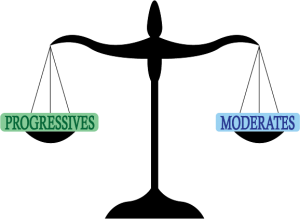Sometimes a progressive step forward is a backpedal in election season
October 13, 2019
In any presidential election, if a candidate wants to win, there are steps that must be taken. The candidate must first capture their base, then their party’s support. The candidate usually completes this first step when they win their party’s primary and nomination for president. However, if the candidate really wants to win the presidency, they must not only capture their party’s support, but the support of the moderates, independents, and sometimes even members of their opponent’s party. If they can’t win without the states that matter in an election—the swing states Iowa, Colorado, and Michigan—the candidate won’t win the presidency.
When a candidate comes onto the scene with ideas that sit at the far sides of the political spectrum with their policy issues, whether it is a far-left liberal or a far-right conservative, their strong policies risk alienating members of their own party. The resultant is an increase of party members simply abstaining from going to the polls on election day, a surge of support for third party candidates, and in some cases, party members voting for the opposition. Even more common than alienating your own party is pushing away those who lie in the middle—the independents—those with no strong party ties. These are also the types of voters who may lean away from a candidate simply on a disagreement over a few policy points. These types of voters are the ones that can win or lose a candidate an elections even more than a candidate’s party’s base. This is the last thing the Democrats need in 2020 if they want to defeat Trump.
These are the types of candidates we have as front runners in the Democratic primary according to the polls, and that scares me.
Don’t get dissuaded; many Americans, myself included, favor more progressive policies, but the fact is that at this juncture we are living with a monster in the White House and the exterminator isn’t Andrew Yang riding the tide of Universal Basic Income. What will get us out of this situation is realistic policy that fits into today’s political climate, the kind of policy that’s easy to swallow for Democrats and independents alike.
There exists a well-documented trend among political candidates once they leave the primaries, secure their party’s nomination, and enter into the general election: they tend to become more moderate, tone down some of their more outside ideas to something that an Iowan farmer can digest. While sure, this may in theory help a more progressive candidate do better in the general election, we live in a digital world where anything that a candidate says, whether it be while trying to rally their blue state base in their hometown or in a battle cry of a tweet, that Iowan farmer will remember those things, will remember the candidates’ real policies. So, when the candidate dawns their “moderate” general election facade, that’s not enough to get the vote of the Iowan farmer who didn’t like what they said about healthcare for undocumented immigrants in the primaries. And these progressive candidates will lose a lot more votes than just that one farmer if they keep pushing for these far-left ideas.
A progressive may shore up a Democratic win in states like California, but a Democrat winning California is about as uneventful as a full moon. For the Democratic nominee for president to defeat Donald Trump, they need to appeal to voters that a progressive would appeal to once in a blue moon. When a candidate takes strong progressive stances, they may secure the votes on the far left, but that’s not where the majority of voters lie. These Democratic candidates need to appeal to the middle, or at least make themselves easier to stomach to the middle than Donald Trump. A progressive would not accomplish this feat.


